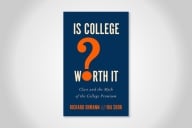You have /5 articles left.
Sign up for a free account or log in.
It’s fall, and the academic year is about to start again, so it’s time for the annual bout of questioning and self-questioning that we teachers of the humanities engage in all the time, but especially now. What shall we teach our students and how shall we teach it? What texts shall we use? What questions will we ask? What will we hope our students gain from our classes?
I have been teaching humanities-based courses over the past 40 years, in high schools and universities, and I’m persuaded that right now the question it is most important to pose to our students (and also to ourselves) is the question of ideals. I ask (and hope that others will also ask) the students who take our classes where they stand on the question of the great ideals. This isn’t just an intellectually engaging question, though surely it is that. It is also a question about how the students, and their teacher, too, should lead their lives.
By posing the question of ideals, one will inevitably encounter some of the greatest writing we have: some of what Arnold called “the best that has been thought and said.” By reflecting on the ideals one can learn a great deal about the tactics of interpretation and the art of writing. But more than that, one can learn to know oneself and begin to think about how to live in the world.
The ancient world offers us three major ideals, which I call (using some shorthand) the ideals of courage, compassion and contemplation. Later in time, great artists have put forward the life of imagination as an ideal, though that ideal is less firmly established than the other three.
Where do you stand on the matter of ideals? To answer that question, you need to develop a sense of what ideals are. I turn to Homer and Virgil to understand the ideal of courage; to Plato to understand the contemplative ideal; and to Jesus, Buddha and Confucius to understand the ideal of compassion. I’m also open to the possibility that my students might want to reject ideals out of hand, or at least carefully modulate their engagement with the ideal (ideals are dangerous). So I expose them to a few writers who have affirmed a worldly but humane and decent way of life: I often use Freud, but George Orwell or Michel de Montaigne could do just as well.
So now we have our syllabus. What happens then? We’ll begin with the heroic ideal, the oldest in the world. We try to learn what exactly it means to be a hero, at least to Homer and Virgil. We reflect on Achilles, who fears nothing and wants to be the greatest warrior who ever lived. We think about the more humane Hector, who is the archetype of the citizen soldier, and who fights to defend his city. We consider Aeneas, the pious warrior who lives for his father, his son and his people -- and who, the story has it, leaves the ashes of the city that Hector has died defending and founds Rome.
We ask questions. Is Achilles really a hero, or is he simply a killing machine? Is Hector being a coward when he flees Achilles, running from him around the walls of Troy? Is Aeneas’s modesty really compatible with being a fierce warrior?
These questions involve careful reading and interpretation. The students write about who they think the heroes are and why they matter -- or do not. But I also ask the students if these heroic archetypes provide them with what the Harvard University philosopher William James called “living options.” How much do they want to emulate these heroes, if at all? What place does courage have in their daily lives and what part would they like it to have? What sort of courage would they want to emulate: that of Achilles, or of Hector, or of Aeneas -- or perhaps of some other figure they have encountered in literature or in life? Would any of them consider committing themselves to a life of martial valor, in which bravery and honor take a central place for them and become their ideal?
We interrogate the ideals. Teaching a liberal arts curriculum is about enquiry, not indoctrination. Is the heroic ideal too often based on vanity and the narcissistic belief that though others may perish we ourselves will never die? I want my students to think about Freud’s critique of honor and heroism, as well as the critique that’s implicit in Shakespeare, and particularly in the King Henry plays. “What is honor?” asks Falstaff -- and he answers himself (and maybe speaks for Shakespeare): honor is a mere word, nothing special. More recent critiques of male violence and male bonding from the feminist perspective also come into play here and allow the students, male and female, to think twice and twice again about the heroic ideal.
Skepticism about ideals -- yes, to be sure: that’s part of the course. But I want to do what James hoped his teaching would do: open up possibilities for life. I also want students to be exposed to the life of compassion through study of Jesus and the Buddha and Confucius and to the life of thought through Plato. I don’t want this to happen uncritically -- even Plato has his detractors, though to be sure all philosophy is a footnote to his work. Yet still, I want my students to be open to the possibility of being influenced by the great ideals -- in small and measured ways, yes. But also in larger ways, too: they should have the chance to consider organizing their lives around the pursuit of an ideal.
Though the earliest promulgators of the great ideals may be male, they are there to be engaged by men and women and people of all races and origins. (If there is a culture in the world that does not revere bravery and wisdom and courage, I have not come across it.) What is feminism, what is egalitarian thinking, if not a call for equal access to the fruits of the best that has been thought and said?
I think that the enquiry into ideals is of particular importance now. This is because students at present often seem to feel that they are facing two options in life. They can pursue what I call the life of the self: they can try to succeed and prosper and live a measured, humane life. Or they can reject this life as sterile and selfish. Most of my students don’t see any other possibility: they can conform, or they can quit. The life of pragmatic success and the pursuit of middle-class happiness seem all there is, and they can take it or they can leave it.
But there is another kind of life: the life devoted in large measure to the ideal. Those who have followed the ideal path have often lived hard lives and met harsh ends. Think of Socrates; think of the martyred saints; think of the aspiring heroes who have died young. But many men and women have also found that commitment to the ideal fills life with meaning and intensity and even sometimes with joy. Those men and women may be wrong. All the defenders of worldliness and practicality may be right. But students should be allowed to hear both sides of the debate and to decide for themselves.
This is not a chance conversation, says Socrates, but a dialogue about the way we ought to live our lives.
Teach the ideals!








